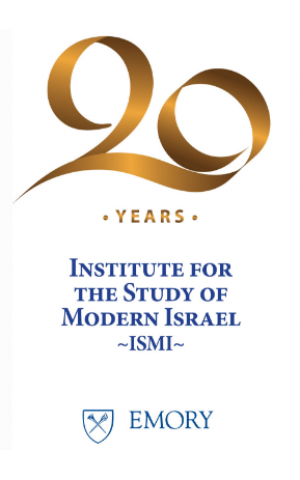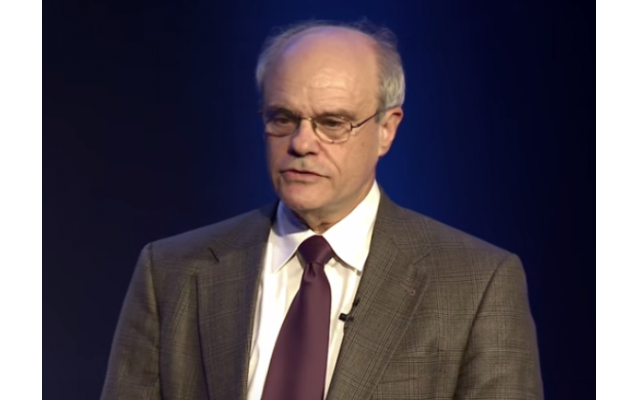Emory’s Institute for Israel Studies Celebrates 20 Years
Ken Stein and ISMI hosted 14 visiting scholars to Emory to teach about Israel, educated high school teachers and students, sponsored study abroad and more.
Twenty years ago, Emory University’s Institute for the Study of Modern Israel was founded by Kenneth Stein, professor of contemporary Middle Eastern history, political science and Israeli studies, because, as he puts it, “I couldn’t do it all by myself anymore.”
The center describes itself as an interdisciplinary department that does not confer degrees. It is said to be the oldest permanent Israel academic center in the United States.
In the past two decades it has brought 14 visiting scholars to Emory to teach about Israel, created recurring programs to educate high school teachers and students about Israel, sponsored study programs in Israel, and generously promoted the study and discussion of Israel in the local community.
Next week, Nov. 10-11, when the institute formally celebrates its 20th anniversary, it will present a weekend of programming that is open to the public and a Saturday night fundraising dinner with Israeli singer, Aveva Dese.
We caught up with Stein to ask about plans for the anniversary celebration.

AJT: What makes this weekend so special?
Stein: Normally, when we go into a congregation or we go to an organization, we get to hear one, maybe two good speakers. I want to bring to the weekend a dozen.
We have a guy coming who for four years followed the money that Palestinian terrorist organizations were using to fund organizations. He’s going to tell us the whole story of how the Department of Treasury did it.
We have a guy coming who worked on Capitol Hill for 25 years for Congressman Tom Lantos. He’s going to talk about making American foreign policy toward the Middle East through the eyes of a congressional staffer who had to plan all the interviews that were necessary with specialists before ideas became laws. We have a guy here who helped negotiate the Oslo accords in 1993. He knows more about negotiating with Yasser Arafat than any living Israeli. … He has some wonderful insights about how you negotiate with the Palestinians.
We’ll also talk about plans for one state, two state or three states.
I think those are the kind of things that you can’t read about in the New York Times, you can’t read about in a blog, you can’t get in Politico.

AJT: How difficult is the environment in the academic world today for someone like yourself who studies and teaches about Israel?
Stein: On other campuses is it difficult to sustain the study of modern Israel with academic rigor and honesty and integrity? Yes, it is.
And I think that’s because the classroom has become not just on Middle Eastern issues, the classroom has become a podium for preaching and not necessarily a podium for teaching. There is a greater tendency now for academics to believe that they can use their time in front of the classroom to pronounce their point of view as if somehow their point of view is more important than someone else’s.
I don’t think it’s my duty or responsibility to be paid by someone’s tuition so that I can spout to them what my political beliefs are. I want someone to understand how Israel came into being. How did the Jews do it? Why is it important? Why is it important for American foreign policy? What are Israel’s pitfalls? What are the things that are unfinished? What can Israel still do to make its society better for its own citizens?
AJT: Last week the president of Israel spoke to the Jewish Federations of North America’s General Assembly in Tel Aviv and suggested that we must increase the exposure of young Israelis to U.S. schools, camps and so forth— a kind of reverse Birthright. What do you think?
Stein: About half the Jews in the world are within the United States and half in Israel. There are major distinctions between Israeli Jews and American Jews. The distinctions are about how they view security and how they view religious identity, how they view access to the Wall.
Those are big differences and create big cleavages. But knowledge of the other I think is important if we’re to stay together as one tribe but many minyans.
I think there is a danger, to be honest, if the American Jewish world and the Israeli Jewish world dismiss the other. We’re much stronger when we’re together. Maybe we only come together in times of crisis. But knowing the differences of the other allows us to be a lot more accommodating and may make us reduce the volume of our rhetoric and the frequency and the shrillness of our criticism of others.
For more information or to register for the Emory Institute for the Study of Modern Israel weekend, visit www.ismi.emory.edu or call 404-727-2798.




comments